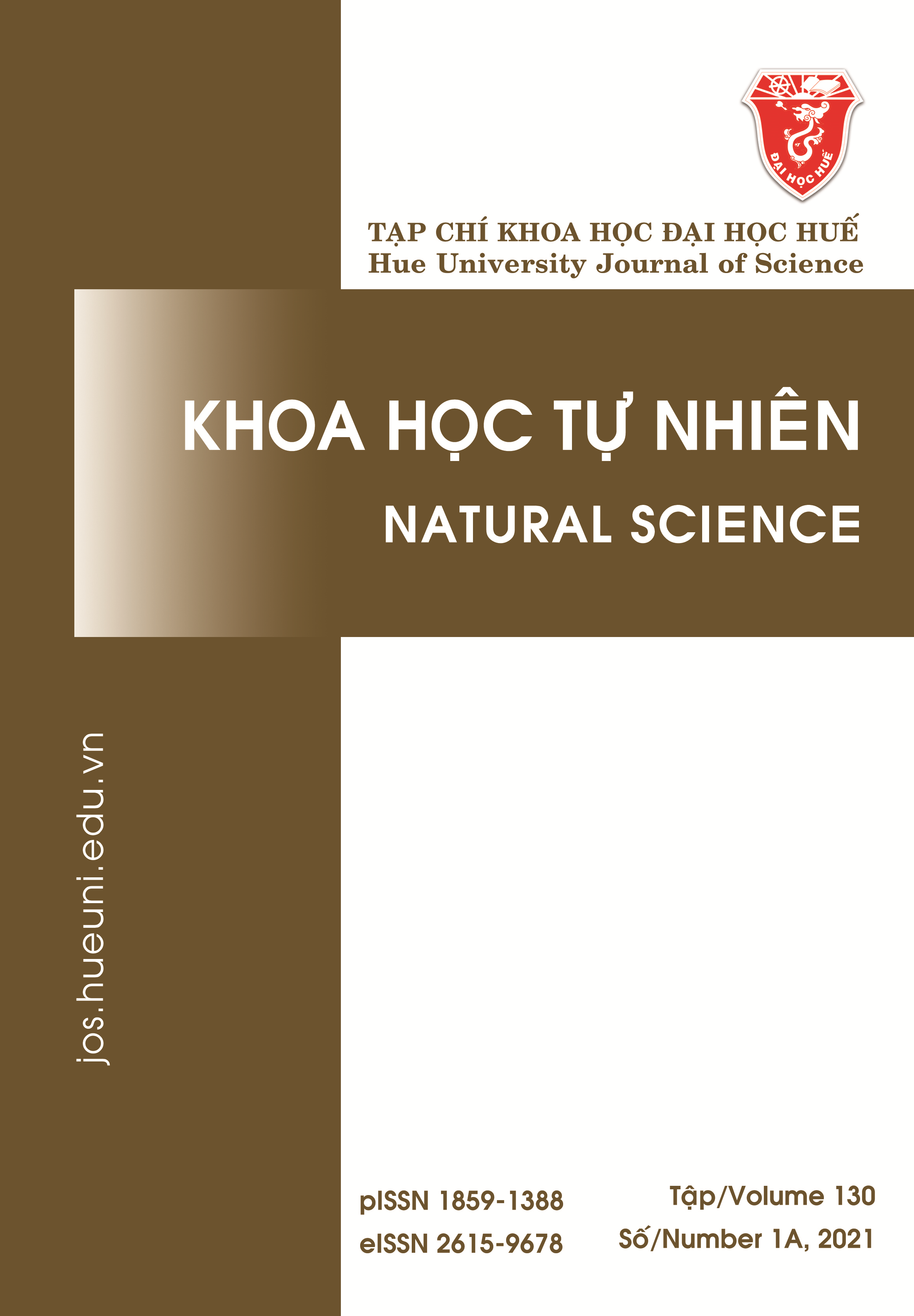Abstract
Leaf blight is one of the most severe bacterial diseases in most rice-cultivating countries all over the world. Therefore, this research was carried out to seek effective plant extracts for managing this disease. The extracts of garlic, tamanu, and periwinkle were utilized as pure and combined with the zinc acetate solution 1 mM. Under in vitro conditions, the pure extract of periwinkle and its combination with zinc acetate induces the inhibition efficiency against Xanthomonas oryzae pv. oryzae of approximately 24.32 and 100%, respectively. In net houses, the seed-soaked and foliar sprayed treatments at 15, 30, and 45 days after growing cause rice plants to produce bactericide polyphenol compounds, and the effect lasts until 96 hours after pathogen inoculation. The disease reduction of treated rice leaves lasts to the 14th day after pathogen inoculation. At this moment, the pathogen density in treated leaves is lower than that of the control.
References
- Vũ NQH, Hồng HTK. Đặc điểm sinh trưởng và năng suất của giống lúa Đài Thơm 8 trong vụ Đông Xuân 2017-2018 tại Thừa Thiên Huế. Tạp chí Khoa học Đại học Huế: Khoa học Tự nhiên. 2018;127(1C):171-179. DOI: http://dx.doi.org/10.26459/hueuni-jns.v127i1C.4886.
- Tề LL. Trồng trọt (tập 2). Hà Nội (VN): Nhà xuất bản Giáo dục; 2000. 147 p.
- Hải NTT, Phương TNM, Thủy NTT, Hòa TT. Tổng hợp vật liệu nano bạc và đánh giá khả năng kháng nấm Pyricularia oryzae gây bệnh đạo ôn trên lúa. Tạp chí Khoa học Đại học Huế: Khoa học Tự nhiên. 2019;128(1C):69-76. DOI: http://dx.doi.org/10.26459/hueuni-jns.v128i1C.5181
- Tề LL, Mân VT. Bệnh vi khuẩn và virus hại cây trồng. Hà Nội (VN): Nhà xuất bản Giáo dục; 1999. 207 p.
- Walters D, Newton A, Lyon G. Induced resistance for plant defence, 2nd ed. New Jersey (USA): Wiley-Blackwell; 2014. 331 p.
- Kim PV. Các nguyên lý về bệnh hại cây trồng. Cần Thơ (VN): Trường Đại học Cần Thơ; 2000. 190 p.
- Agrios GN. Plant Pathology. Massachusetts (US): Academic Press; 2005. p. 93-142.
- Thuy TTT. Infection biology of Bipolaris oryzae in Mekong Delta of Vietnam [dissertation]. Copenhagen: The Royal Veterinary and Agricultural University. Department of Plant Biology. Plant Pathology section; 2002. 121 p.
- Cương NC. Bước đầu đánh giá hiệu quả kích kháng lưu dẫn chống lại bệnh cháy lá lúa (Pyricuaria grisea (Cooke) Sacc) của một số dịch trích từ thực vật. Cần Thơ (VN): Trường Đại học Cần Thơ; 2002. 51 p.
- Thiều NN. Khảo sát khả năng kích kháng lưu dẫn của một số loại dịch trích thực vật đối với bệnh đốm vằn do nấm Rhizoctonia solani Kuhn trên lúa. Cần Thơ (VN): Trường Đại học Cần Thơ; 2008. 40 p.
- Vân NTK. Khảo sát kích thích tính kháng bệnh thán thư (Colletotrichum sp). trên cây ớt của salisylic acid, clorua đồng và monopotassum phosphate trên khía cạnh mô học [luận văn]. Cần Thơ: Trường Đại học Cần Thơ. 2008. 82 p.
- Châu LM. Khảo sát mô học khả năng kích kháng của một số hóa chất đối với bệnh thán thư do nấm Colletotrichum lagenarium trên dưa leo (Cucumis sativus L.). Cần Thơ: Trường Đại học Cần Thơ. 2007. 66 p.
- Bhumi G, Savithramma N. Biological synthesis of zinc oxide nanoparticles from Catharanthus roseus (L.) G. Don. leaf extract and validation for antibacterial activity. International Journal of Drug Development and Research. 2014;6(1):208-214.
- Jamdagni P, Khatri P, Rana JS. Green synthesis of zinc oxide nanoparticles using flower extract of Nyctanthes arbor-tristis and their antifungal activity. Journal of King Saud University – Science. 2016;30: 168-175. DOI: https://doi.org/10.1016/j.jksus.2016.10.002.
- Raut S, Thorat DPV, Thakre R. Green synthesis of zinc oxide (ZnO) nanoparticles using Ocimum tenuiflorum leaves. International Journal of Science and Research (IJSR). 2013;4/5:1225-1228.
- Đệ NN. Giáo trình cây lúa. Cần Thơ: Trường Đại học Cần Thơ; 2008. 187 p.
- Neergaard ED. Methods in botanical histopathology. Denmark: Danish Government Institute of Seed Pathology for Developing Countries; 1997. 191 p.
- Châu HM. Sinh học về sự xâm nhiễm của nấm Pyricularia grisea trên lúa và khả năng kích thích tính kháng bệnh cháy lá lúa của cloarua đồng và acibenzolar-s-methyl trên khía cạnh mô học [luận văn]. Cần Thơ: Trường Đại học Cần Thơ; 2003. 79 p.
- Koch M. Methods for assessing resistance to bacterial blight. In: International Rice Research Institute. Bacterial blight of rice: Proceedings of the International Workshop on bacterial blight of rice. Manila (Philippines): International Rice Research Institute; 1989. p. 114.

This work is licensed under a Creative Commons Attribution-ShareAlike 4.0 International License.
Copyright (c) 2021 Array




